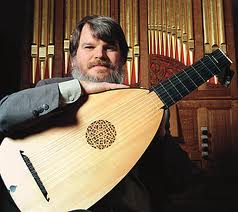November 7, 2011. Boyce Lancaster interviews Paul O'Dette.Paul O’Dette is a Grammy-nominated American lutenist, conductor, and overall specialist in early music.He plays the lute, the Baroque guitar and mandolin, the theorbo and other Renaissance and Baroque instruments.Here he plays a Baroque guitar; the piece, Fandango, is by Santiago de Murcia (1673 – 1739), a Spanish composer and guitarist.The wonderful Toccata Arpeggiata (here) is by the German-Italian Johann Hieronymus (Giovanni) Kapsberger (1580 –1651); it’s played on the theorbo, a long-necked lute.You can hear that it’s a much more powerful instrument than the baroque guitar.And here O’Dette plays a lute.The piece is Piva, by the early 16th century Italian lutenist and composer Joan Ambrosio Dalza (all three pieces are courtesy of YouTube).The complete interview is here, and below is Boyce’s introduction to his conversation with Paul O’Dette.
The Masterful Talent of Paul O’Dette.
The Toronto Globe and Mail described Paul O’Dette as the clearest case of genius ever to touch his instrument.No one I have spoken with regarding Paul and his playing has ever disputed that, but they are usually surprised when I mention that his acquaintance with the classical guitar and his eventual love for the lute family came about because he wanted to be a better rock guitarist.The story he tells in part two of our conversation (which you can hear below) would sound like something a publicist created, had I not heard it straight from Paul himself.It is a story, which has been corroborated by his family.
His quest is still to improve his playing continues, but it has been some 35 years since he last touched an electric guitar.He did confess, however, to occasionally throwing a blues lick into something he is playing!That is really not such an odd practice, however, as much improvisation was expected of musicians of the day.He explains that, if you look at a piece of modern music next to a lute tablature, you’ll see two entirely different languages.The tablature is much easier to understand, especially for a novice, as it simply tells you where your fingers go on the fretboard, rather than what note to play.It also expects the player to be able to improvise and add ornamentation.
What that means is that understanding performance practices of the day and learning what composers meant in what they wrote can be the difference between being a good, or even great, player and being a masterful one.I think most would agree that Paul O’Dette has attained master status.
Paul O'Dette
November 7, 2011. Boyce Lancaster interviews Paul O'Dette. Paul O’Dette is a Grammy-nominated American lutenist, conductor, and overall specialist in early music. He plays the lute, the Baroque guitar and mandolin, the theorbo and other Renaissance and Baroque instruments. Here he plays a Baroque guitar; the piece, Fandango, is by Santiago de Murcia (1673 – 1739), a Spanish composer and guitarist. The wonderful Toccata Arpeggiata (here) is by the German-Italian Johann Hieronymus (Giovanni) Kapsberger (1580 –1651); it’s played on the theorbo, a long-necked lute. You can hear that it’s a much more powerful instrument than the baroque guitar. And here O’Dette plays a lute. The piece is Piva, by the early 16th century Italian lutenist and composer Joan Ambrosio Dalza (all three pieces are courtesy of YouTube). The complete interview is here, and below is Boyce’s introduction to his conversation with Paul O’Dette.
He plays the lute, the Baroque guitar and mandolin, the theorbo and other Renaissance and Baroque instruments. Here he plays a Baroque guitar; the piece, Fandango, is by Santiago de Murcia (1673 – 1739), a Spanish composer and guitarist. The wonderful Toccata Arpeggiata (here) is by the German-Italian Johann Hieronymus (Giovanni) Kapsberger (1580 –1651); it’s played on the theorbo, a long-necked lute. You can hear that it’s a much more powerful instrument than the baroque guitar. And here O’Dette plays a lute. The piece is Piva, by the early 16th century Italian lutenist and composer Joan Ambrosio Dalza (all three pieces are courtesy of YouTube). The complete interview is here, and below is Boyce’s introduction to his conversation with Paul O’Dette.
The Masterful Talent of Paul O’Dette.
The Toronto Globe and Mail described Paul O’Dette as the clearest case of genius ever to touch his instrument. No one I have spoken with regarding Paul and his playing has ever disputed that, but they are usually surprised when I mention that his acquaintance with the classical guitar and his eventual love for the lute family came about because he wanted to be a better rock guitarist. The story he tells in part two of our conversation (which you can hear below) would sound like something a publicist created, had I not heard it straight from Paul himself. It is a story, which has been corroborated by his family.
His quest is still to improve his playing continues, but it has been some 35 years since he last touched an electric guitar. He did confess, however, to occasionally throwing a blues lick into something he is playing! That is really not such an odd practice, however, as much improvisation was expected of musicians of the day. He explains that, if you look at a piece of modern music next to a lute tablature, you’ll see two entirely different languages. The tablature is much easier to understand, especially for a novice, as it simply tells you where your fingers go on the fretboard, rather than what note to play. It also expects the player to be able to improvise and add ornamentation.
What that means is that understanding performance practices of the day and learning what composers meant in what they wrote can be the difference between being a good, or even great, player and being a masterful one. I think most would agree that Paul O’Dette has attained master status.